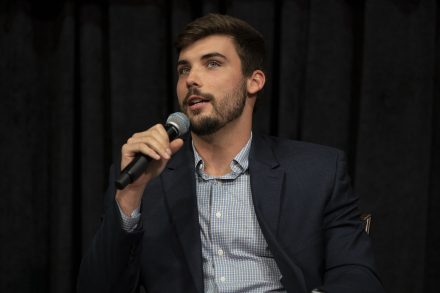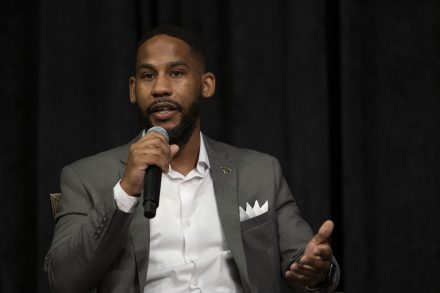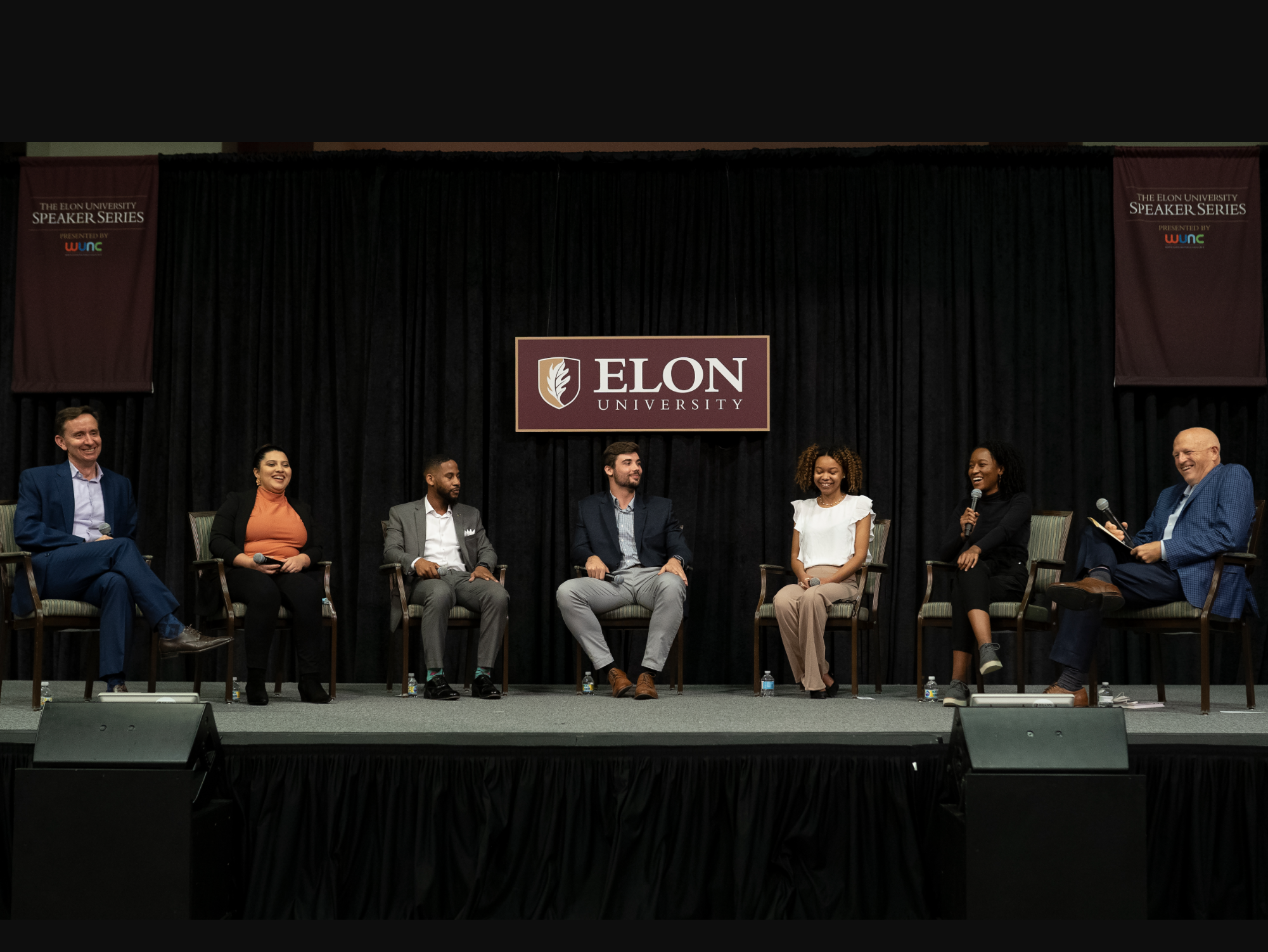This theme of year’s Elon University Speaker Series, presented by WUNC North Carolina Public Radio, is the “Power of Relationships."
As a part of The Elon University Speaker Series, President Emeritus Leo M. Lambert and Assistant Provost Peter Felten sat down with five recent Elon alumni to explore how mentorship during their time at Elon made important contributions to their success while at the university and beyond.

“Research has told us that for more than five decades, student relationships with peers, faculty and staff matter a great deal to student success and persistence in college. One of the most important things that students can do in college is to develop what Brad Johnson at the Naval Academy calls ‘a constellation of mentors,’” Lambert said.
Lambert and Felten co-authored a book focusing on that very topic – “Relationship-Rich Education: How Human Connections Drive Success in College.” They are working on a new book on relationship-rich education that will be directed toward a student audience.
Felten recalled the interview he and Lambert had with David Scobey, who is now director of Bringing Theory to Practice, which is based at Elon, on the importance of belonging for students. “Lots of the schools that we visited do a wonderful job of having an orientation and the faculty are really intentional. And that’s important. But what David said to us is, ‘What students need is relentless welcome,’” said Felten, who is the director of the Center for Engaged Learning.

“They need to feel welcomed every day, in class, on campus, by their peers and others. It’s that foundation that allows everything also to happen,” he added.
In writing the book, Lambert and Felten visited nearly 29 higher education institutions across the country, interviewed approximately 400 students, faculty, staff and experts, and analyzed decades of research by higher education scholars. With all their compiled data, they came to four principles of what relationship-rich education is all about.
The four main principles of their book, according to Felten, are:
- All students must experience genuine welcome and deep care.
- Relationships are a powerful means to inspire all students to learn.
- All students must develop webs of significant relationships.
- All students need meaningful relationships to help them – and to challenge them – to explore the big questions of their lives.
Yasmeen Lee ’20 graduated with a bachelor’s degree a public health studies and was also an Odyssey Program scholar, Lumen Scholar and Honors Fellow at Elon. Lee credits Stephanie Baker, associate professor of public health studies, as her first and most influential mentor at Elon.

The transition from a teacher-student relationship to one of a mentor-mentee is difficult, Lee said, but Baker was instrumental in her Elon career and in her successful application to the UNC-Chapel Hill Gillings School of Public Health, which is where she is currently a master of public health candidate.
“I started off being not sure about my major and I took her Intro to Public Health Studies class, and I loved it, loved the topic, loved her teaching,” Lee said. “As an Honors Fellow, I knew my sophomore year I’d have to find a mentor. I was really nervous to approach her to be my mentor … but she took me in with open arms.”
Matt Foster ’20 graduated with a degree in engineering and pursued two engineering research projects at Elon. He was also team captain of the Phoenix football team and 2019 CAA scholar-athlete of the year. Today, Foster develops next-generation X-ray security systems as a design engineer and owns his own boat mechanic business serving the Raleigh, Durham and Fayetteville areas.

During his time at Elon, Foster said he’s lucky to have had multiple “mentors of the moment.” Looking for a summer internship, he went to Cayce Crenshaw, assistant director of athletics for academic support services.
Crenshaw then helped him get involved with Elon’s SURE (Summer Undergraduate Research Experience) program, which is where Foster met Assistant Professor of Engineering Richard Blackmon.
After doing summer research with Blackmon, he realized he enjoyed research and wanted to continue. Blackmon connected him with other engineering researchers which Foster started a business. Then he managed to get in contact with professors in the School of Business on how to start a company.
“All of those little steppingstones that really just started by me asking Cayce, ‘What am I going to do this summer?’” he said.
For James Donnell ’19 L’21, intentionality is key in the role of being a mentee. Having a mentor is essential for student success, but it’s also the student’s responsibility to put forth effort in that process as well, Donnell said.

Donnell, who received his bachelor’s degree in political science and was an Odyssey Program scholar before pursuing his juris doctor at the Elon University School of Law, said that students would be surprised to know the number of people that want to help.
“To all the first-year students or young students, just be intentional with your actions,” Donnell said. This intentionality can be shown in many ways, such as reaching out to people who you want to learn more about, following up after speaking with them and just showing initiative, Donnell said.
In his own experience with wanting to gain information from people working at a certain company or even at Elon, he realized that simply emailing or sending a LinkedIn connection was the best way to go about it. “You just have to take that initiative and just be intentional with the thing that you want to happen,” Donnell said.
Finding a mentor can be a difficult thing, especially when you don’t feel a sense of belonging. That was something Mirella Cisneros Perez ’19 experienced during her first two years at Elon. It wasn’t until she began working at the Latinx-Hispanic Union and El Centro that she felt a sense of belonging, a component she said is necessary to have a fulfilling college experience.

“You know mentors are important in your life because it’s not just about school, it’s also about life. One of the first people I started talking to that really helped me was a professor in the School of Education, Scott Morrison. He was really there for me,” Perez said. “It’s when you talk about those moments in your life with other people that you realize they don’t always relate to the struggles you’re going through, but the fact that they make time to listen can really make a difference.”
At Elon, Perez was an Odyssey Program scholar and Teaching Fellow. Currently she is a community impact manager at the educational nonprofit LatinxEd in Chapel Hill. She said she now serves as a mentor because she knows exactly how challenging it can be to go through life without someone there to support you.
“Because of the experiences I’ve had and knowing the difference between not having someone and having someone, I always reach out to people in my or students who are graduating and just letting them know, ‘I’m here, I’ve been through it,’” she said.
Natalie Green ’21 graduated from Elon with degrees in strategic communication and sociology. Green was vice president of communications for the Black Student Union, a SMART mentor, an Odyssey Program scholar and T. Howard Scholar while at Elon. She now works with The New York Times as a client coordinator in advertising sales.

The most influential mentor she had was Dean of the School of Communication Rochelle Ford. But to have a connection with Ford, Green said she first had to build a web of mentors to lead her.
Through various student peer mentors, she began working in the CREDE and BSU. Through the CREDE, she gained a valuable mentor in Brandon Bell, associate director for the CREDE, who helped her to meet with Ford, who had just arrived at Elon in 2018.
“She’s such a valuable person to guide me along my journey here at Elon. Now that I’m a graduate, she still is there to support me,” she said. “Sometimes you doubt yourself as a student. But Dean Ford has been there to push me along, give me that guidance, give me the support I need. Especially as a Black woman, it’s been inspirational to see her leadership here on campus and how she transforms the School of Communications and makes an impact on the students that she speaks with every day.”
Although the series feature Elon alumni and administrators, the idea of cultivating relationship-rich education is a topic that all universities are grappling with.
“I think I came away from this project also thinking that even though we looked at a really wide variety of institutions, what college students experience and college students are facing are almost universal,” Lambert said.
Fundamentally, what college is about is seeking out the people who interest you and then building a transformative relationship with them, Felten said. The relationships are created in many ways, but it’s not how they are formed that matters, it’s what is gained from them.
“If you meet that one person who lights a fire within you, the rest will be taken care of,” Felten said.



